The value of cooperation in today's hectic and cutthroat workplaces cannot be emphasized. The saying "Teamwork makes the dream work" has gained popularity and emphasizes the strength that comes from people cooperating with one another to achieve a common objective.
In this blog, we dig into the unquestionable value of cooperation in the workplace and examine its genuine meaning. Teamwork not only boosts productivity but also fosters a sense of camaraderie and shared success among team members. It does this through improving creativity and problem-solving skills as well as establishing a healthy workplace culture. Join us as we explore the fundamentals of successful cooperation and see how it paves the way for success and expansion in any business.
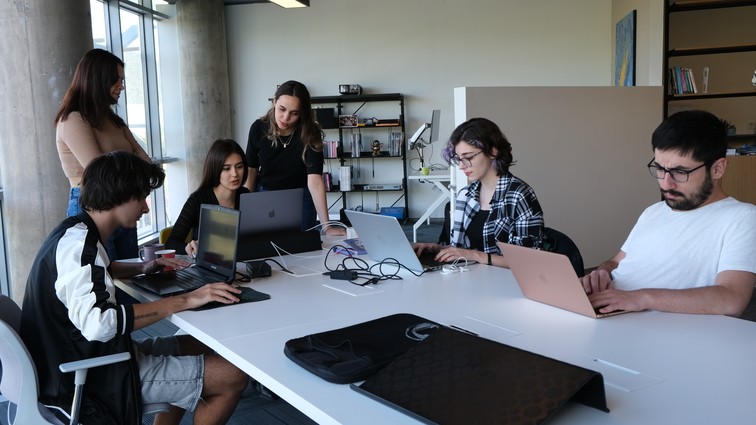
How Do You Define Good Teamwork?
A collaborative and synergistic effort in which people cooperate to achieve common goals by using their own talents and abilities is what is meant by "good teamwork." There is free communication, respect for one another, and a feeling of trust among good and bad team members in a team that works well together. They actively promote and support one another while appreciating various viewpoints and thoughts.
Effective problem-solving requires team members to contribute their skills and come up with creative solutions. Dream team members are flexible and receptive to changes, accountable for their duties, and take responsibility for their jobs. Overall, effective cooperation promotes higher productivity, a pleasant workplace, and the achievement of shared goals.
Why Is Teamwork Important In Leadership?
Because it encourages cooperation, gives people more agency, and makes the most of their abilities to realize common corporate objectives, effective teamwork is essential in leadership. Effective leaders are aware that they can't do it all by themselves, therefore they rely on the skills and assistance of their team members.
Through teamwork, supervisors may assign tasks according to team members' abilities, therefore increasing production and efficiency. Leaders may drive their high-performing teams to feel appreciated and motivated by encouraging open communication and fostering a culture of trust.
This will enhance engagement and work satisfaction among the team members even during team meetings. In addition, team members are more inclined to share their own viewpoints and ideas when they feel empowered and heard, which promotes creativity and problem-solving. Overall, leadership teamwork fosters a pleasant and encouraging work atmosphere, advancing the company toward success.
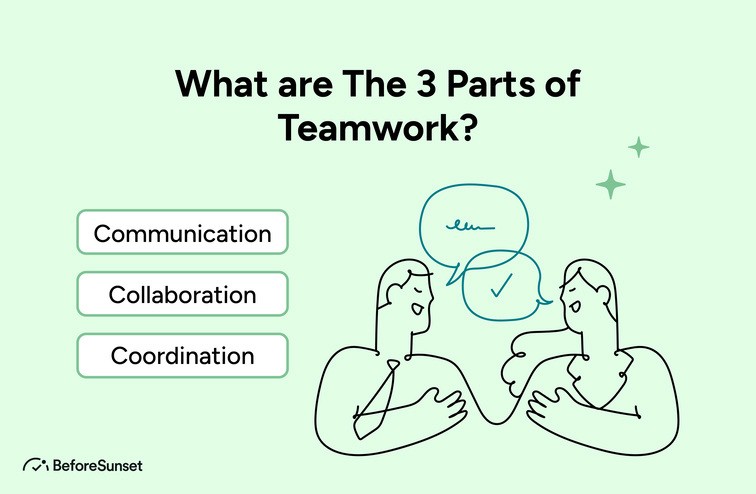
What are The 3 Parts of Teamwork?
The three essential parts of teamwork are communication, collaboration, and coordination.
Communication: Effective communication is the foundation of successful teamwork. It involves the clear and timely exchange of information, ideas, and feedback among team members. Good communication ensures that everyone understands their roles and responsibilities, project objectives, and any changes or challenges that arise. It also fosters trust and helps resolve conflicts constructively.
Collaboration: Collaboration is the active working together of team members towards a common goal. It entails combining individual skills, expertise, and efforts to achieve collective outcomes. In a collaborative environment, team members contribute their unique perspectives and knowledge, support each other, and share resources to overcome obstacles and drive innovation.
Coordination: Coordination involves organizing and aligning team activities to ensure that they complement each other and progress smoothly toward the team's objectives. This includes assigning tasks based on individuals' strengths, setting timelines, and managing interdependencies between different parts of the project. Effective coordination avoids duplication of efforts and helps streamline workflow.
What Is Saying Teamwork Makes The Dream Work?
The adage "Teamwork makes the dream work" highlights the strength and efficiency of working as a dream team to realize common objectives and aspirations. It implies that people are capable of achieving much more when they work together, combining their abilities, knowledge, and efforts.
The expression emphasizes the value of cooperation, communication, and group problem-solving as well as the benefits that may be attained when individuals come together for a shared goal. It serves as a reminder that success frequently depends on good collaboration and cooperation rather than just being the consequence of individual genius.
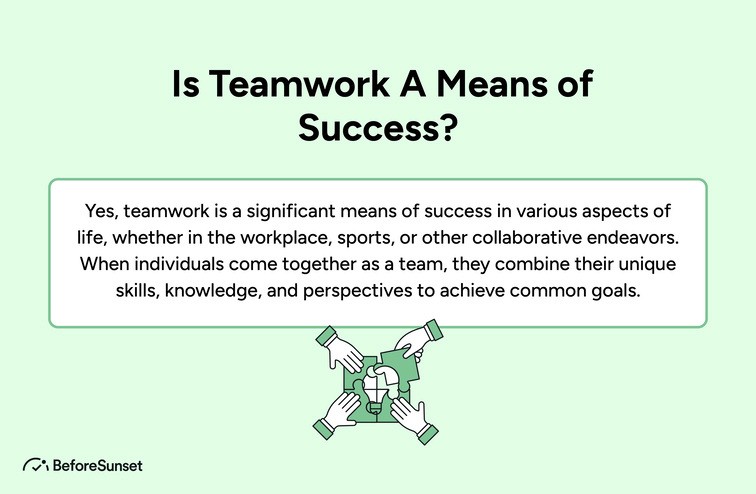
Is Teamwork A Means of Success?
Yes, teamwork is indeed a significant means of achieving success. Working in a collaborative and strong team culture can lead to numerous benefits that contribute to success in various aspects of life, including:
Synergy: Team members can combine their unique strengths and skills, creating a synergistic effect that enhances productivity and efficiency. When individuals work together, the overall output can be greater than the sum of individual contributions.
Diverse Perspectives: Teamwork brings together people with different backgrounds, experiences, and viewpoints. This diversity of perspectives allows for more comprehensive problem-solving and innovative ideas.
Shared Responsibility: In a team, tasks and responsibilities are distributed among members, reducing the burden on individuals and promoting a sense of shared ownership and accountability.
Motivation and Support: Being part of a supportive team can boost morale, motivation, and job satisfaction. Team members can inspire and encourage each other, leading to higher levels of engagement and commitment.
Risk Mitigation: Teams can collectively identify and address potential risks and challenges, leading to better risk management and improved decision-making.
Learning and Development: Teamwork fosters a culture of continuous learning and skill development. Team members can learn from one another, acquiring new knowledge and competencies.
Adaptability: Teams can respond more effectively to changes and dynamic environments. Collective brainstorming and problem-solving enable teams to be flexible and adaptable to shifting circumstances.
Positive Work Environment: A team performance that collaborates well often creates a positive and inclusive work environment, promoting camaraderie and cohesion.
Innovation and Creativity: Teamwork allows for the cross-fertilization of ideas, sparking creativity and fostering innovation through collective brainstorming and open dialogue.
Increased Efficiency: With well-coordinated efforts, tasks can be completed more efficiently, leading to higher productivity and achieving goals more effectively.
Understand What Teamwork Really Means
Teams are essential in modern life. They collaborate to achieve a common goal. However, what does teamwork entail? The dictionary teamwork is 'the activity of working well together as a team."
There are many different types of teamwork, each with its own definition. Even though the term "teamwork" is usually connected with sports teams, it can also be used in a business context. The workplace is possibly the context in which the term "teamwork" is used most frequently.
Teamwork is essential because it ensures you have someone to rely on when things become difficult. It also implies that you can share your ideas with people who are willing to listen and provide assistance when necessary.
You might also like the following:
Why Teamwork is Key to Success?
When we work together, there is nothing we cannot accomplish as individuals or as a group. A task that would take a single individual a long time to complete can be completed in a short period of time by a team with a wide range of perspectives and backgrounds. In this way, teamwork helps you make the dream work.
A study based on a cross-sectional survey demonstrates that cooperation is regarded as essential for producing high-quality work and experiencing job satisfaction.
'If everyone is moving forward together, then success takes care of itself." ' Henry Ford
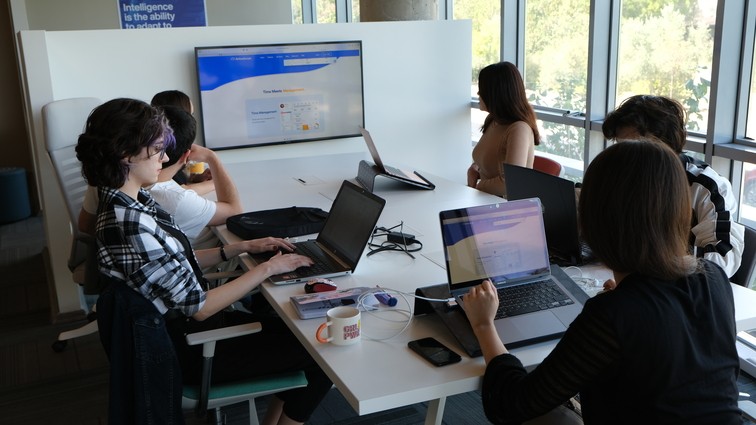
Why Is Teamwork an Important Value?
The ability to operate as a team and combine individual talents, expertise, and viewpoints to achieve shared goals makes teamwork a significant attribute. It promotes teamwork and open communication while fostering a climate of mutual respect, trust, and support. Teamwork improves problem-solving skills and promotes creative thinking, which results in original solutions to difficult problems.
Team members get a sense of ownership and commitment to the team's objectives through delegating tasks and holding one another accountable. Additionally, collaboration promotes a favorable work atmosphere, improving motivation and morale, which in turn results in higher productivity and a more fulfilling job. In addition to fostering individual development, adopting cooperation as a fundamental principle sets the path for group accomplishment and success in any undertaking.
How Success Comes From Team Work?
Collaboration is the key to success because it taps into the strength and potential of people working together to achieve a common objective. When team members pool their various knowledge, expertise, and viewpoints, they produce a synergistic result that improves problem-solving and yields creative answers.
Open communication is fostered by effective cooperation, enabling team members to exchange ideas, offer helpful criticism, and coordinate their activities. Each team member is essential to the project's success since they bring their unique skills to it.
Team members feel driven and appreciated when they have shared tasks and are supported by one another, which increases their dedication to the team's goals. A cohesive team's sense of camaraderie and unity fosters a favorable work environment that raises morale and increases job satisfaction. In the end, a cohesive team's combined efforts result in increased effectiveness, increased output, and the completion of difficult goals, paving the path for success in any undertaking.
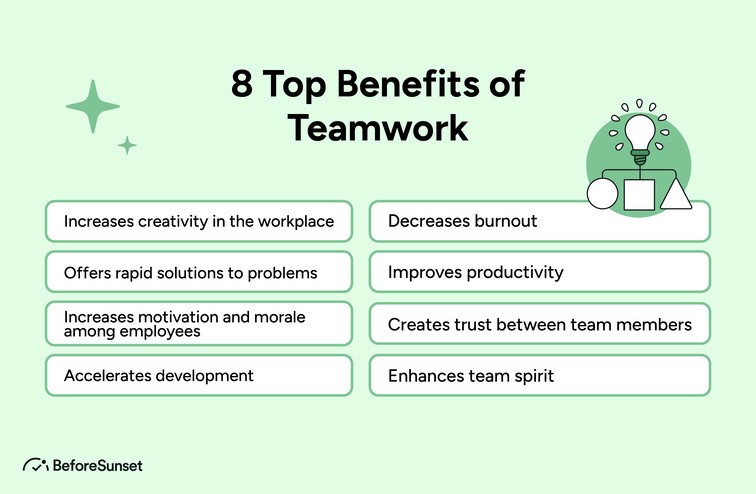
8 Top Benefits of Teamwork
Collaboration with others can have many benefits beyond what is possible for each person. In this post, we'll look at the top eight advantages of cooperation and how they help individuals, businesses, and organizations succeed.
The foundation for attaining shared goals with increased efficiency and effectiveness is laid through cooperation, which also fosters innovation and creativity while improving problem-solving and decision-making. Join us as we explore the transforming potential of cooperation and see how it fosters a productive workplace and increases performance across a variety of areas and businesses.
Increases creativity in the workplace
Working together creates a collaborative environment that encourages and supports innovation. Collaboration among team members results in a richer pool of ideas and solutions due to the different views, experiences, and abilities of the participants.
Open communication and group brainstorming work together to produce creative solutions to problems. Individuals feel more at ease taking creative risks and sharing unusual ideas in a supportive team environment because they know they will receive helpful criticism.
Teamwork's collaborative environment promotes the exchange of ideas, which results in fresh perspectives and revisions that produce elegant and creative solutions. Team members become more motivated and involved in their jobs as they actively participate in and take ownership of the creative process, creating a vibrant and creative workplace culture that fuels the success of the company.
Offers rapid solutions to problems
The capacity to quickly solve difficulties is one of the key advantages of collaboration. When a group of people with different backgrounds and specialties work together to solve a problem, they can develop several viable answers quickly through analysis and brainstorming.
Each team member contributes a distinct viewpoint and method, which results in a deeper comprehension of the issue and a wider variety of viable solutions. As a result of the team's joint problem-solving approach, which encourages creativity and invention, the best possible answer may be found in a shorter amount of time.
Additionally, when team members work together and communicate freely, they may build on one another's ideas, improve methods, and put answers into practice quickly, which eventually results in the quick resolution of complicated problems.
Increases motivation and morale among employees
According to the Association of Psychological Science, even when confronted with challenging work, a person's level of motivation can be boosted by the sense that they are contributing to a team's success.
Accelerates development
Teamwork is a great stimulus for advancement since it speeds up development in many different ways. When people work together, they combine their knowledge and resources to complete jobs and projects more effectively and thoroughly. Team members may learn from one another, exchange best practices, and get new information by having a varied range of abilities and viewpoints, which promotes lifelong learning and personal development.
Tasks may be accomplished concurrently thanks to the team's combined effort, which shortens the time needed to meet objectives. Additionally, cooperation creates an inspiring and encouraging environment that raises team members' morale and dedication to the completion of the project.
As team members actively engage and communicate, they are better able to recognize and quickly solve problems, making modifications and improvements to hit development goals more quickly. In the end, teamwork's collaborative nature and sense of shared ownership speed up growth and aid businesses in more quickly and effectively achieving their goals.
Even troubled teams can achieve great team outcomes by following team norms. You can set up an online teamwork group to create respectful relationships. It creates both a supportive environment and a fair environment.
Decreases burnout
Significant advantages of teamwork include reduced team member fatigue. The task is spread among team members according to their talents and expertise in a well-functioning team, avoiding individual employees from feeling overburdened and burned out.
Team members may rely on one another for support and encouragement, minimizing feelings of isolation and stress, and this fosters a healthy work atmosphere. Individuals may concentrate on their strengths and areas of expertise because to collaboration's ability to share responsibilities and assign duties.
Additionally, group problem-solving and decision-making can result in more practical and successful tactics, simplifying processes and lowering unneeded pressures. In the end, teamwork's feeling of community and mutual support reduces burnout and fosters general well-being, making the workplace healthier and more productive.
Improves productivity
In the workplace, teamwork greatly raises productivity. When people work together as a team, they may split duties according to their skills and areas of strength, producing more effective and specialized work. Team members may reduce duplication of effort and streamline workflows by having a common purpose and a clear grasp of their respective roles and responsibilities.
Effective team communication keeps everyone on the same page, preventing miscommunications and wasting time on misalignment. Because team members assist and motivate one another to fulfill deadlines and accomplish goals, collaboration also promotes responsibility. Additionally, cooperation promotes a favorable workplace, enhancing morale and job satisfaction, which in turn results in an increase in involvement and devotion to the tasks at hand.
Overall, a well-functioning team's combined efforts and synergy increase productivity and produce superior results for the business.
Creates trust between team members
Through the promotion of open communication, cooperation, and mutual support, teamwork builds trust among team members. As a team works toward a common objective, members grow to feel interdependent and dependent on one another's contributions. Team members may freely express their thoughts, opinions, and concerns thanks to effective communication. Individuals feel heard and appreciated when there is openness and receptivity to criticism.
This helps to create trust. Successful outcomes result from collaboration and cooperation in overcoming obstacles, which strengthens the team's faith in each other's talents. Furthermore, a sense of camaraderie and empathy develops among team members as they assist one another through both victories and disappointments, further strengthening trust.
This culture of trust within the team fosters a pleasant work environment where people feel at ease taking chances, being vulnerable, and collaborating to achieve a common goal.
Enhances team spirit
By encouraging a sense of cohesion, togetherness, and shared purpose among team members, teamwork improves team spirit. A strong relationship and a shared dedication to achievement are fostered by working together towards shared objectives. The team members' motivation and morale are raised because of the shared duties and successes, which foster a sense of support and appreciation.
As the team members share in triumphs, they create a supportive team environment that encourages a sense of belonging and togetherness. Additionally, cooperation enables members to benefit from one another's knowledge, respect other viewpoints, and cherish individual contributions. Team members are more willing to go above and beyond for one another and the company when there is a culture of cooperation and collaboration at work.
In addition to enhancing team relationships, this stronger sense of unity results in greater levels of engagement, productivity, and overall performance.
That is why you must be involved in team-building exercises, feedback loop, use chat programs and go to team retreats and team seminars. An average team has a team leader and team players. A perfect team should have a team agreement document. Team competitions and team functions can increase team member expectations.

What are 4 Teamwork Skills?
Four essential teamwork skills are:
Communication: Effective communication is the cornerstone of successful teamwork. It involves actively listening to others, expressing ideas clearly and concisely, and providing constructive feedback. Good communication ensures that team members understand each other's perspectives and work cohesively towards common objectives.
Collaboration: Collaboration is the ability to work together as a team, pooling individual strengths and expertise to achieve shared goals. It involves being open to others' ideas, respecting diverse viewpoints, and actively contributing to group discussions and activities.
Conflict Resolution: Conflict is inevitable in any team setting, and the ability to resolve conflicts constructively is a crucial teamwork skill. Team members need to address disagreements with empathy, remain focused on finding solutions, and ensure that conflicts do not escalate into negative dynamics that hinder progress.
Flexibility and Adaptability: Teamwork often requires adaptability and flexibility to handle changing circumstances and unforeseen challenges. Being open to new approaches, adjusting to shifting priorities, and embracing changes with a positive attitude are essential qualities that contribute to successful teamwork.
3 Tools that Make Good Teams Great
Slack:
It also offers a wide variety of integrations, making using it both practical and enjoyable, enabling you to collaborate in real-time with your team members.
Jira:
Jira is intended to help members of a team manage projects more effectively. Currently, it is still being used as a tool for managing work. You and your coworkers have the ability to strategize, coordinate, and manage your tasks. It facilitates real-time collaboration with your team for more effective project management.
BeforeSunset AI:
BeforeSunset AI offer features to create and track tasks. Team members can see their responsibilities clearly, set deadlines, and monitor progress. This promotes accountability and ensures that everyone is on the same page regarding project milestones.
Building and Leading Successful Teams
Creating a cohesive and effective team is crucial for achieving organizational objectives. A successful team is more than just a group of talented individuals; it's about creating a cohesive unit that works towards common team goals.
This involves fostering a culture where every member feels like a team player, contributing their unique skills and perspectives to develop effective solutions.
Balancing work and personal life is essential for maintaining a healthy team. Encouraging team members to prioritize their well-being can prevent burnout and promote a more positive and productive work environment.
In addition, understanding the different types of teams and leveraging the unique ability of people can enhance team dynamics and performance.
Effective communication is key, whether through eye contact in face-to-face interactions or creating a strong online community for remote teams. Building trust and clear communication channels help in forming a well-built team that can tackle challenges and innovate.
Leadership plays a critical role in guiding teams. Drawing insights from leaders like John Maxwell can provide valuable strategies for team building and leadership development. Maxwell emphasizes the importance of understanding and aligning organizational objectives with team efforts, ensuring that everyone is working towards the same vision.
Ultimately, building a successful team is about creating a supportive environment where each member feels valued and capable of contributing to the team's success.
Empower Your Team with BeforeSunset AI's Team Version
Lead your team to reach the goals. BeforeSunset AI's Team Version is designed to help you set and achieve your team's objectives efficiently. Use team tags to set clear, specific goals and categorize tasks to ensure everyone knows what needs to be done and by whom. This structured approach helps keep the team focused and aligned on the same path to success.
Analyze and track your team's progress. With BeforeSunset AI, you can easily monitor the progress of your projects. The platform provides a comprehensive overview of your team's achievements and workload, allowing you to make informed decisions and adjust plans as needed to keep everyone on track.
Check your employees' well-being. Beyond task management, BeforeSunset AI prioritizes the well-being of your team members. The platform gathers insights into team time stats, moods, and statuses, helping you prevent burnout and maintain a healthy, motivated team environment. This holistic approach ensures that your team is not only productive but also engaged and happy.
Manage capacity and resources effectively. By providing a clear view of each team member's progress, BeforeSunset AI enables better resource management. This ensures that workloads are balanced and resources are allocated efficiently, optimizing the team's overall performance.
With BeforeSunset AI's Team Version, you can lead your team more effectively, ensuring that goals are met, team members are supported, and resources are used wisely. Discover how our platform can transform the way your team works and thrives.


